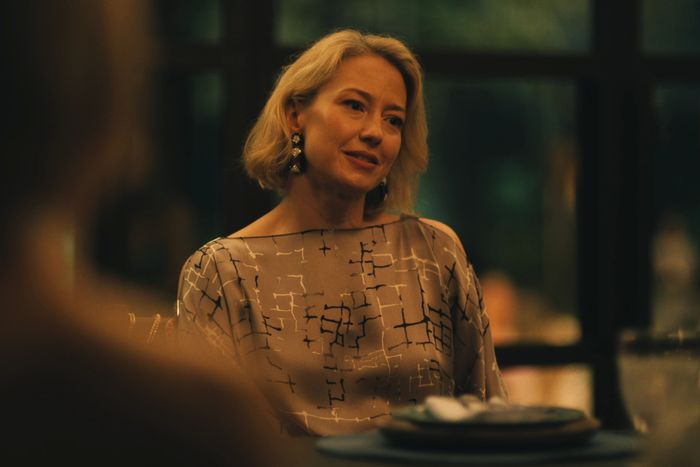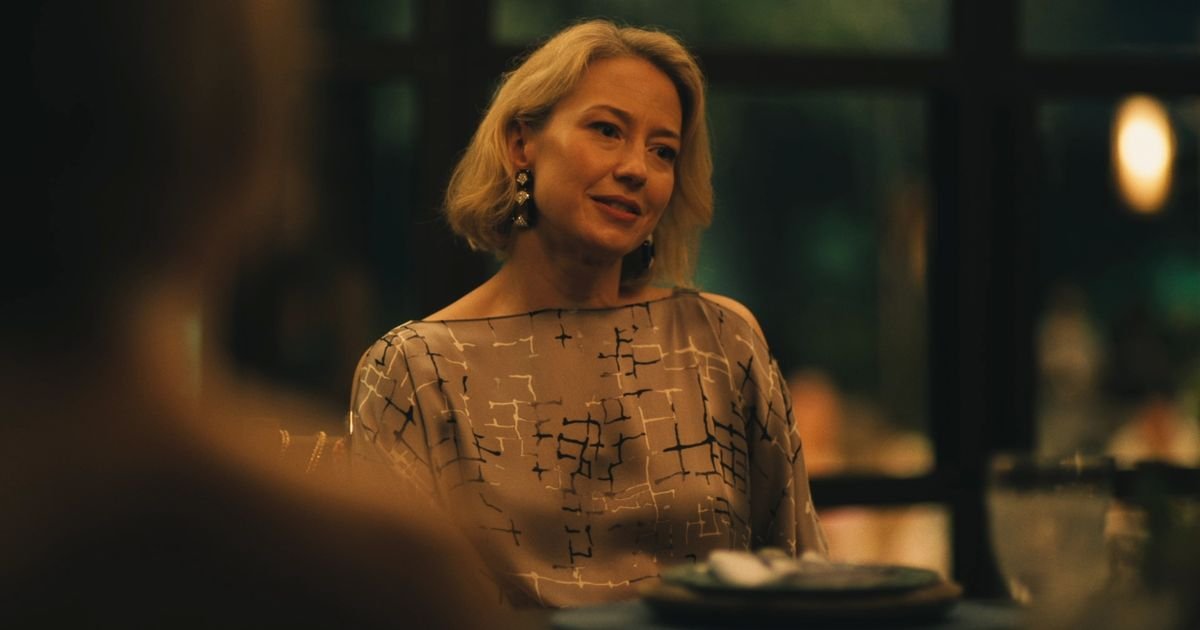

Spoilers follow for The White Lotus season-three finale, “Amor Fati.”
The pinnacle of The White Lotus’s third season could have been Laurie’s monologue. At dinner on the last night of their girls’ trip, Laurie, played by Carrie Coon, listens to her friends Jaclyn and Kate talk about how lovely the trip has been, how happy they are, and how it feels like they’ve finally come into a season of life where they can reap the rewards of their past choices. “My garden is in bloom,” Kate says. “I’ve just been on cloud nine all week,” Jaclyn responds. But Laurie feels differently. “All week I’ve just been so … sad,” Laurie says when they turn to her. She realizes she has no belief system, and the vacation has made it too easy to look back on her choices and feel regret. “Work was my religion for forever, but I definitely lost my belief there,” she says. She tried love, but that didn’t help. She tried being a mother, and that didn’t save her either. But she’s had an epiphany. “I don’t need religion or God to give my life meaning, because time gives it meaning. We started this life together,” Laurie says, “and I look at you guys and it feels meaningful.”
This moment of revelation should, by all rights, be the sweeping and profound thesis statement of The White Lotus’s third season. Its idea is both simple and inarguable: even without being bonded by a shared value system, or motivated by similar goals, these three women, who’ve shared so much time, can still be anchors in each others’ lives. It is not a satisfying resolution, and it doesn’t make Laurie any less sad, but it is still a way to find meaning in a relationship that has otherwise drifted apart. In a season of The White Lotus that were more carefully constructed, this argument could’ve had resonance across the season’s other major storylines, becoming not just a throughline for a poignant season, but also a lovely metaphor for the experience of watching The White Lotus. What is TV, after all, except meaning accrued slowly over time spent together? But a thesis statement alone does not make a well-constructed season of TV, and no matter how true it may be, a monologue like Laurie’s does not play well in episode eight if episodes one through seven have not been built to support the pay-off.
The Ratliff family, perpetually loathing, fearing, resenting each other, or rubbing each other off, end the season with a newfound appreciation for the resilience of family — they have no choice, given that the father Timothy defrauded them out of all of their resources. This discovery about time spent together, though, is the basis of Timothy’s small remaining hope for their future. Terrified of facing the reality of failing his family, he contemplates killing them all (except for Lochlan, his youngest, most aimless son), only to chicken out just at the moment they all start sipping his poisoned piña coladas. Then Lochlan ends up swigging a protein shake from the toxic Bosch, and finding his unconscious body is what shocks Timothy into clarity. Their time on earth is more valuable than whatever creature comforts Victoria insists she cannot live without.
Rick, meanwhile, has failed to realize exactly this same thing and comes to a terrible, tragic end. He’s furious that wealthy hotelier Jim Hollinger stole his childhood time with his father. He murders Hollinger in revenge, only to learn Hollinger was his father all along. He’s now lost his father twice over, and to top it off, his girlfriend Chelsea, the one person who’s always seen the good in him, gets caught in the crosshairs. Both Rick and Chelsea end up floating among the White Lotus’s water lilies, killed by Rick’s refusal to recognize the good things he’s had right in front of his face.
As a sketchy outline, it makes sense. In practice, all three storylines are marred by missed opportunities and miscalculations. The Ratliffs, somehow promptly on their exit boat despite each being at least slightly poisoned, are abandoned just as they learn of Timothy’s transgression, the moment their stories could become most interesting. Piper and Timothy go through transformative experiences over the season, but Saxon, Lochlan and Victoria remain enigmas to each other and the viewer. Briefly the most fascinating character of the season, Saxon gets almost nothing to do in the finale. What does he now think and want and feel following that fateful handjob? What will Victoria do without her little luxuries? Will Lochlan be able to go to Chapel Hill or Duke, now that the family’s finances are destroyed? In the opening scene of the episode, the monk warns that there is no such thing as resolution. But The White Lotus dodges more than just resolution for the Ratliffs: It skips over the story it promised to tell.
Laurie, Jaclyn and Kate are the season’s standout characters, but there’s palpable sweatiness in the challenge of connecting them to the red herring robbery plotline while also doing the heavy lifting of separately shaping each of them. (Did the show need to spend that much time on muy thai, or the sad Russian dudes dodging deportation?) All of this is excusable to some degree, especially given how well these characters are written. But when Laurie announces her dinner time epiphany, it comes without any indication of how she’s arrived at this newer, more enlightened vision of her life. In past seasons, The White Lotus loved long, lingering shots of someone’s face as they come to understand something new. Think of Tanya scattering her mom’s ashes, or Harper watching Daphne explain her feelings about marriage. There’s a short moment where we watch Laurie look down on her friends in the pool, but she’s just had a humiliating sexual experience, been incredibly drunk for the week, and gotten angrier and angrier at her friends. Standing on the balcony, there’s no clear context for whatever internal shift she’s experiencing. We only see it in retrospect, once it’s been shaped into a pat piece of wisdom.
Rick and Chelsea are the worst of all, because they have had so little to do in the earlier episodes. Rick spends the first few days in Thailand repeatedly muttering about a mission he needs to pursue in Bangkok, and although he and Chelsea briefly encounter the season’s Belinda/Greg plot, they ultimately have very little to do there. Instead, Chelsea spends the season constantly reassuring both Rick and the viewer that she loves him, that she will always be there for him, and that he needs to give up his lust for revenge because it will never make him happier than she can make him. A fantasy of a supportive girlfriend made interesting only through the sheer force of Aimee Lou Wood’s performance, Chelsea never becomes more than a wind-up doll who can only repeat “where’s Rick? I love Rick!” It doesn’t matter that Rick’s story slots neatly into the Carrie Coon monologue’s framework for meaning if he and the viewer spin their wheels until the plot mechanisms finally grind into place. Even worse, what’s meant to be a surprise Greek tragedy-style twist at the end (Hollinger was his father all along!) fails when the twist is something so painfully obvious from the jump.
There are other prominent messages embedded within the White Lotus finale. There’s “money corrupts,” made visible with Belinda’s decision to take Greg’s money, forget about Tanya’s death, and pull the same move on Pornchai as Tanya once pulled on her. There’s also “violence changes people,” as seen through Gaitok’s decision to shoot Rick, his final shift into success at the cost of his humanity. It’s compelling grist for The White Lotus mill, and in sequences — especially Lochlan’s almost-death and Laurie’s monologue — there are flashes where it’s clear that a sturdier, more balanced approach to this season might have resulted in something transcendent. Instead, season three of The White Lotus dawdles too long, trying to save too much of the good stuff for the end. Oddly, that’s exactly the lesson Laurie’s monologue was trying to teach, and the one White Lotus fails to achieve. It’s not about one final moment, or one spectacular achievement of surprise that no one could see coming. The pleasure is supposed to be in the journey.
-
Is The White Lotus Trying to Kill the Smoothie Industry?
-
Woody Harrelson Says His IRL Vacation Took Him Away From The White Lotus
-
What We Know About the Itinerary for The White Lotus Season 4
See All
The White Lotus Didn’t Earn It











